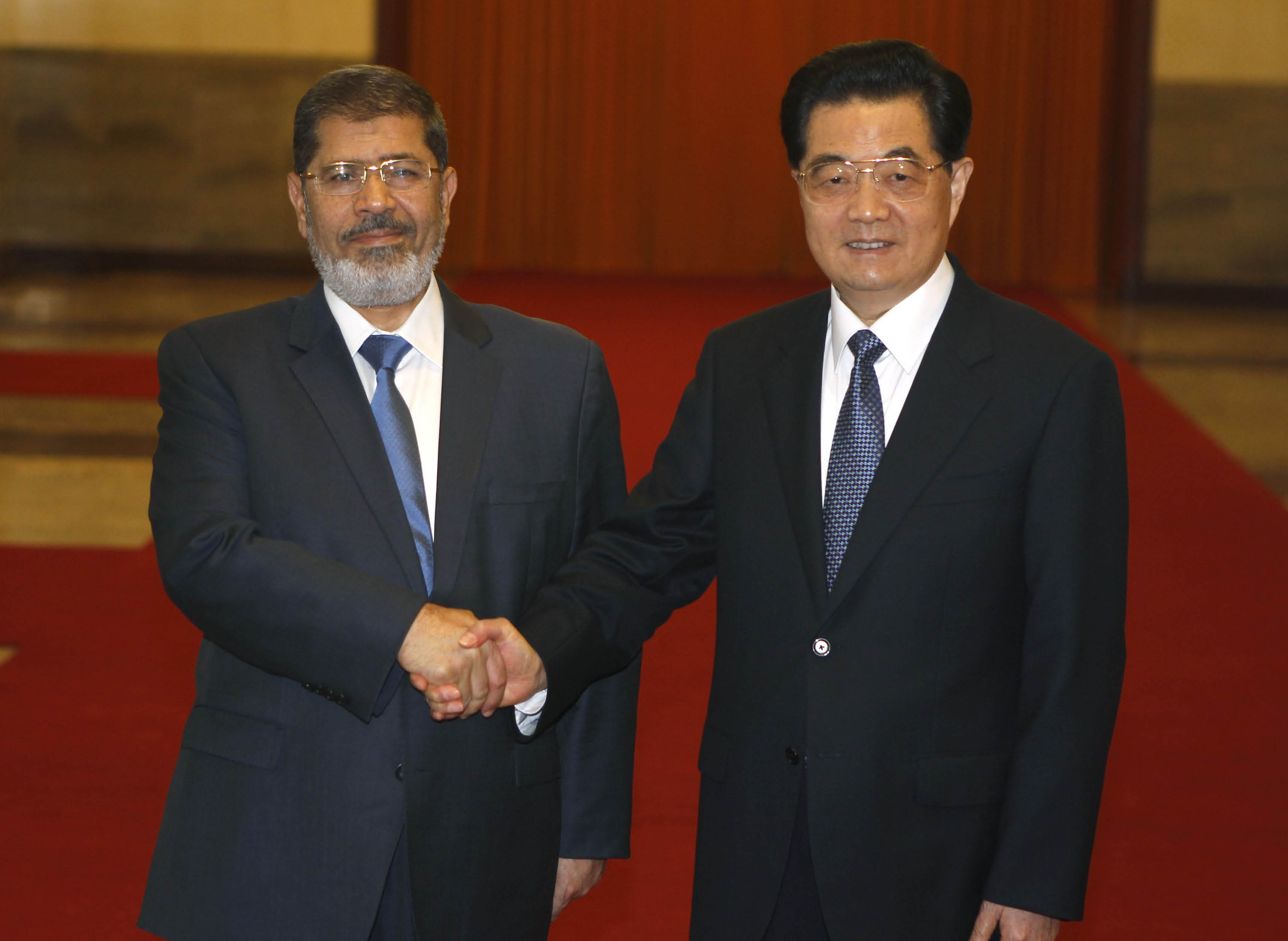WANA in 2012 and China’s Relations with Arab Countries
By WU SIKE
THE year 2012 saw dramatic changes in the WANA (West Asia and North Africa) region, wrought by intertwining conflicts, divisions and regroupings among various forces, each intent on gaining superior development, status and influence. The discussion on the Middle East issue last September in the United Nations General Assembly took the form of stormy debates, albeit weaponless, no less fierce than the relentless battles in the region over the past year.
 |
| Chinese President Hu Jintao receives visiting Egyptian President Mohamed Morsi on August 28, 2012. |
Radical changes, notably regime transitions in certain countries and resultant turmoil in the WANA region, have had huge impact on the Middle East’s political ecology and power structure. Several hotspot issues have arisen. Syria constitutes a polarization of various conflicts. Large countries have sporadically competed in the region over interconnecting, complex and volatile issues. The Middle East trend reflects profound adjustments in the international strategic pattern. In mid-November 2012, Israel launched operation Pillar of Defense as revenge for Hamas’ rocket attacks. The large-scale air strikes on the Gaza Strip caused 1,000 or more casualties, underlining the obduracy on both sides of the Israeli-Palestinian conflict. The double standards that the U.S. exhibits in this respect are also a source of rising discontent in the Arab and Islamic worlds, in the latter of which the Palestine problem is of core importance and a main cause of long-term regional turmoil. Accumulating conflicts between Israel and Palestine threaten to erupt into irrevocable acts of violence at any time.
China pursues the policy of respecting sovereignty and of non-interference in the internal affairs of other countries. It actively safeguards people’s fundamental interests and regional stability, and has steadily developed friendly relations with various countries in the region. Hu Jintao emphasized in his report at the 18th CPC National Congress last November the importance of relationships with developing countries. He reiterated, “China is committed to peaceful settlement of international disputes and hotspot issues, opposes the wanton use of force or threats to use it, opposes any foreign attempt to subvert the legitimate government of any other countries, and opposes terrorism in all its manifestations.” China’s policy on the WANA region constitutes the putting into practice of Hu’s explication of China’s position. In early 2012, Premier Wen Jiabao visited Saudi Arabia, the United Arab Emirates and Qatar to promote development of strategic cooperation with the Gulf countries. The relationship between China and the WANA countries has since maintained a good momentum. Under the backdrop of fundamental changes and turmoil, the trade volume between China and Arab countries reached US $165 billion in the first three quarters of 2012 – up 15.6 percent over the same period of the previous year.
Active Participation in Settlement of the Syrian Crisis
Syria has been a main focus of international attention in the Middle East over the past year, as has China’s attitude and position on the issue.
In the 19 months since the breakout of the Syrian crisis, China has stuck to the policy of political solution, supporting resolutions led by the Syrian people that reflect their reasonable demands. Non-interference in internal affairs, however, does not necessarily mean non-action. China has remained committed to diplomatic efforts to end violence and find a peaceful solution that satisfies all parties. To this end, China raised a six-point plan on political resolution of the Syrian conflict. At the Geneva foreign ministers’ meeting of the Action Group for Syria, Foreign Minister Yang Jiechi also elaborated a four-point proposal for diplomatic mediation between the Syrian government and the opposition. China has sent special envoys to Syria on several occasions, received representatives of the Syrian government and opposition and maintained contact with opposing organizations both in Syria and abroad. The Chinese government has urged the two parties to cease fire and violence and open a political-inclusive dialogue at the earliest possible date. China has maintained close communication with relevant members of the international community, and coordinated among Arab countries and the Arab League. Long committed to the solidarity of the international community, China has constructively participated in UN Security Council discussions and other multilateral forums relating to the Syrian issue, having supported political mediation by the UN-Arab League Joint Special Envoy and the supervisory mission to Syria. China also attended the Geneva foreign ministers’ meeting of the Action Group for Syria, and endorsed the conference’s resolution. China has been scrupulously fair to both parties, maintaining contact with representatives of both the Syrian government and its opposition. In efforts to bring about early settlement of the Syria conflict it has also closely cooperated with the UN-Arab League Envoy for Syria and relevant organizations.

